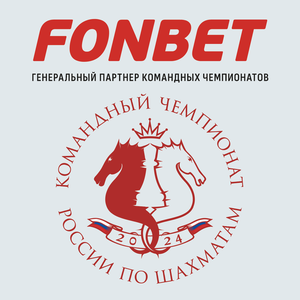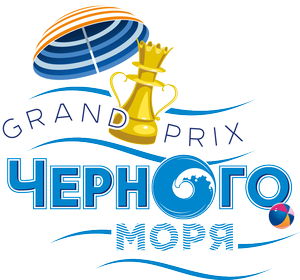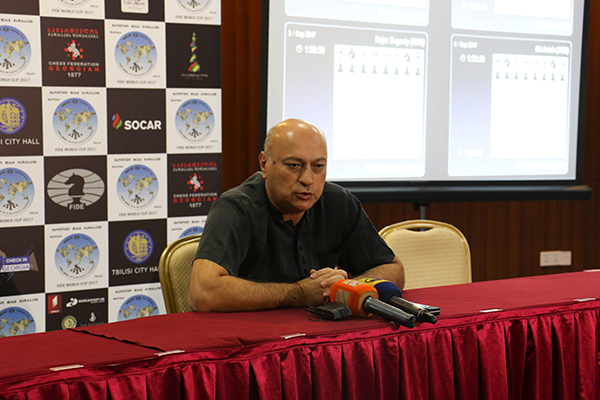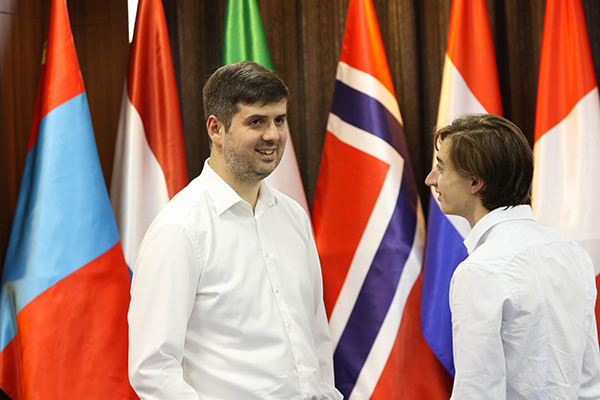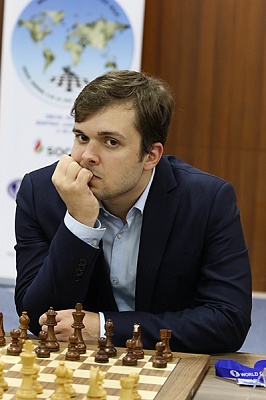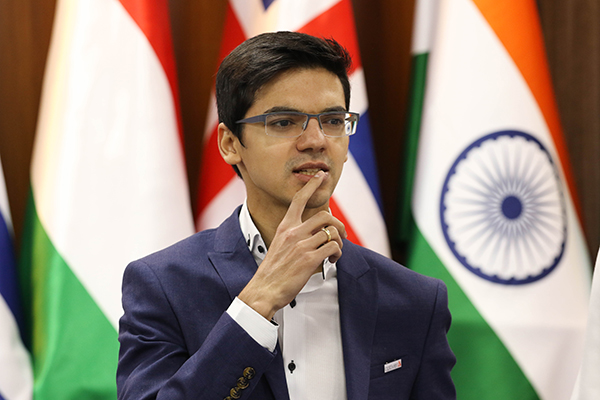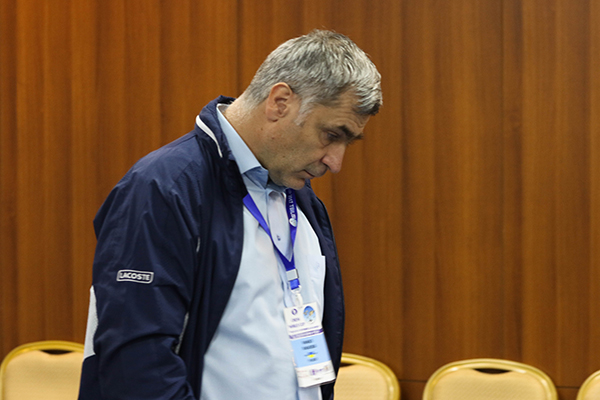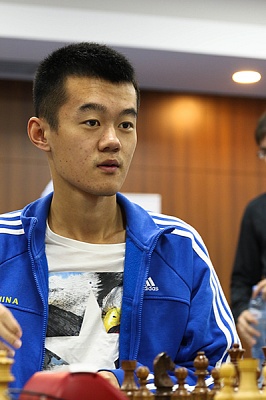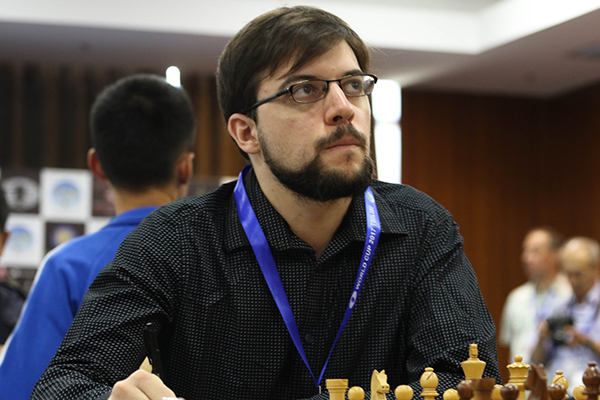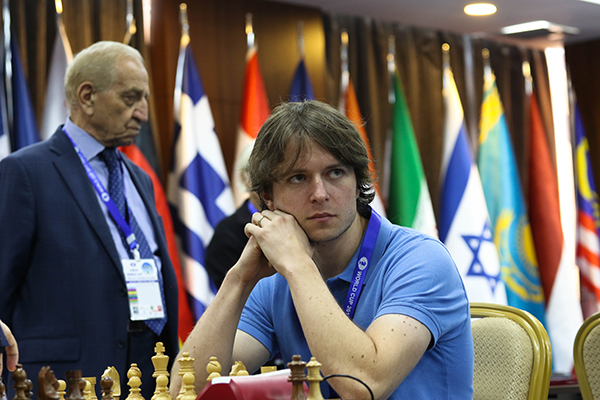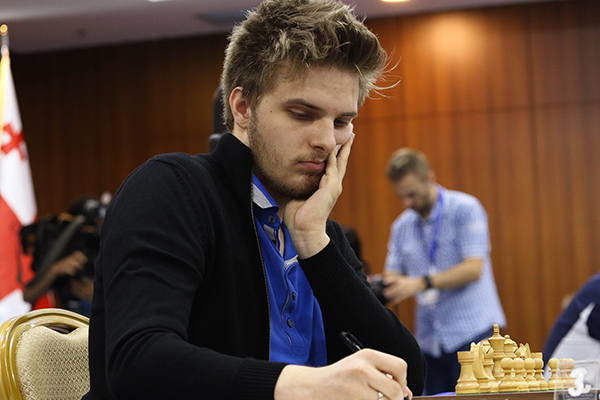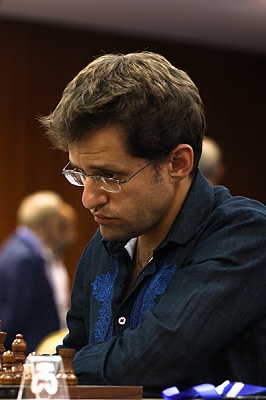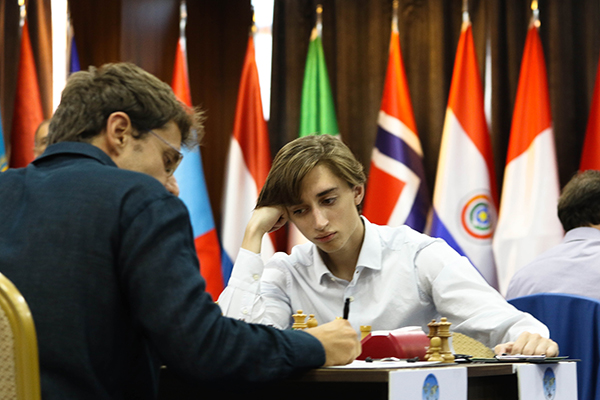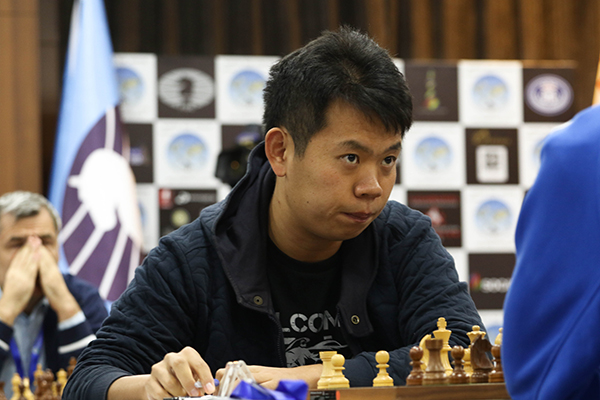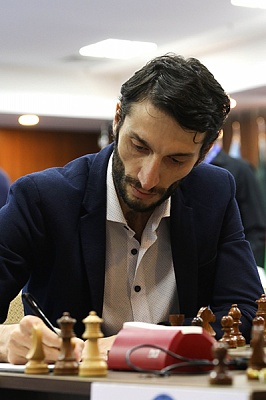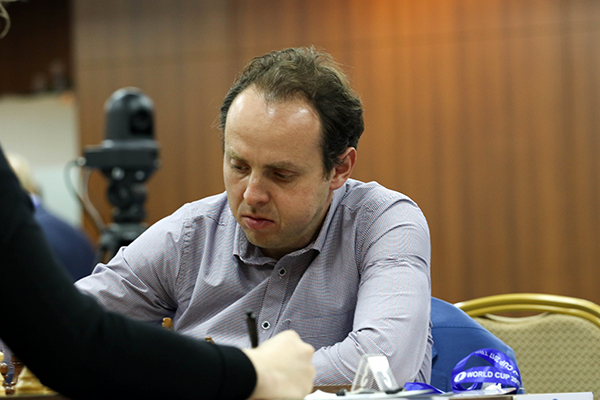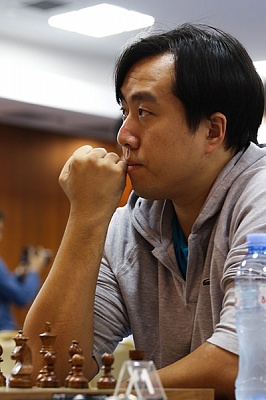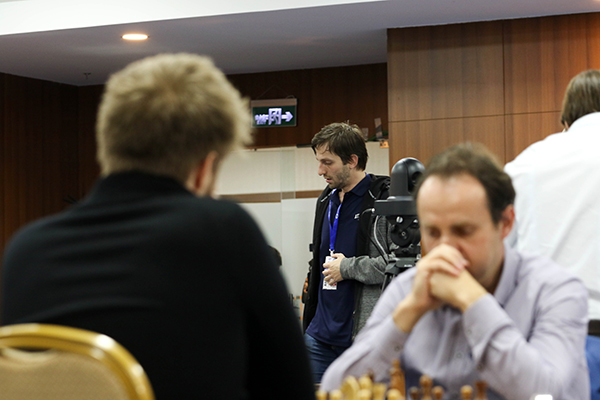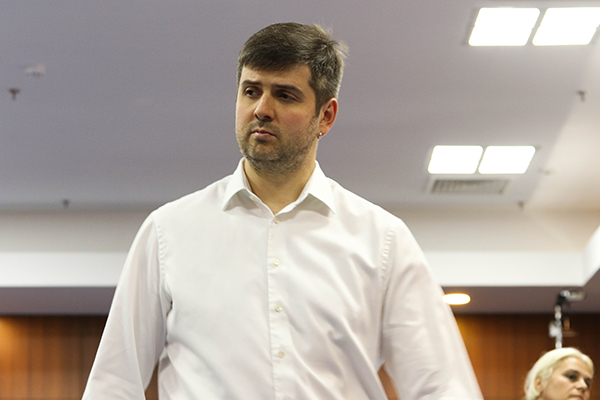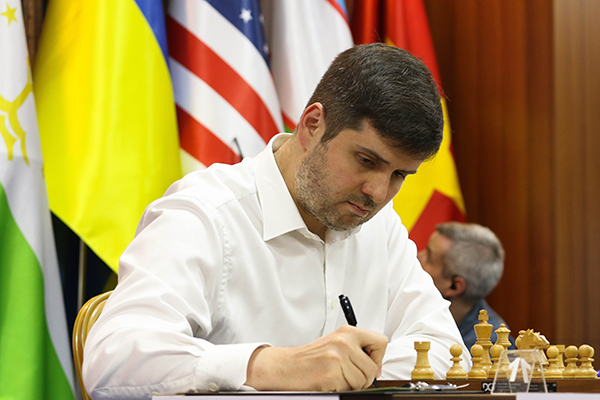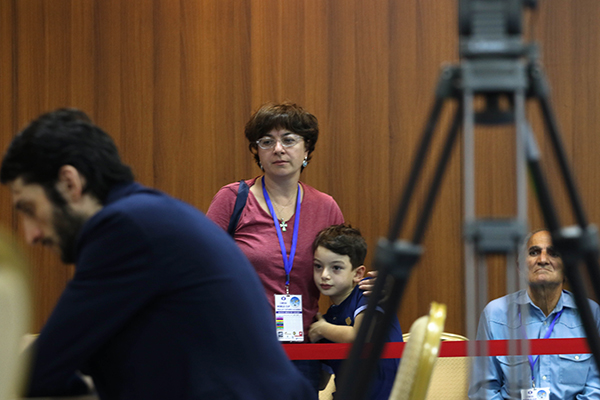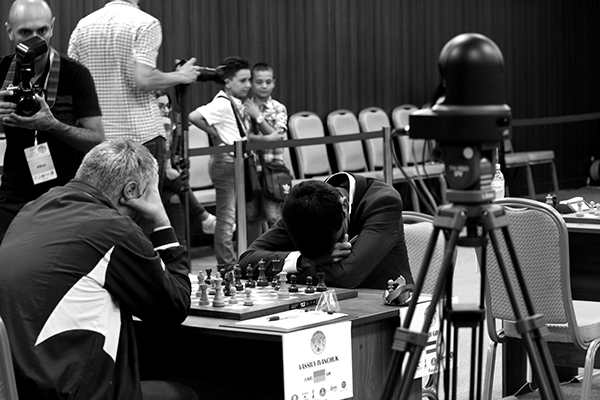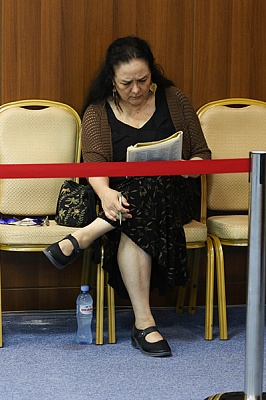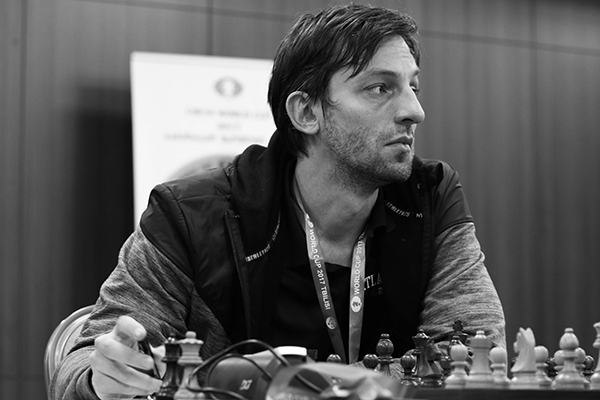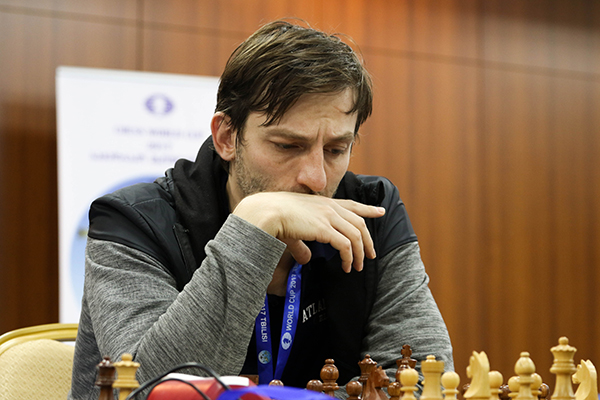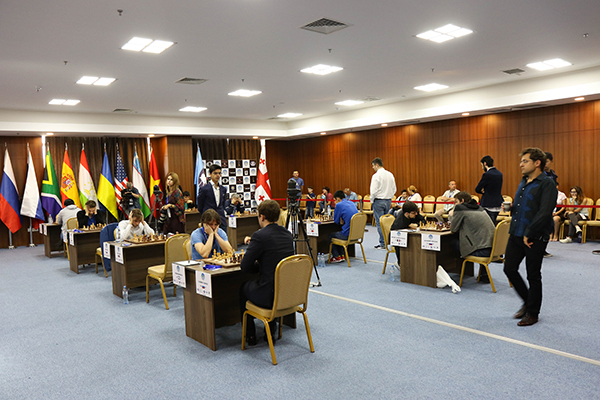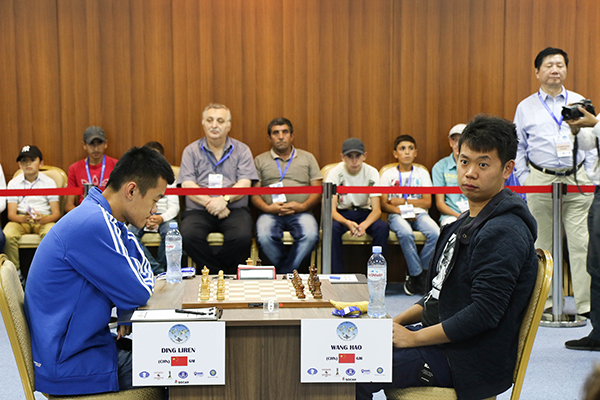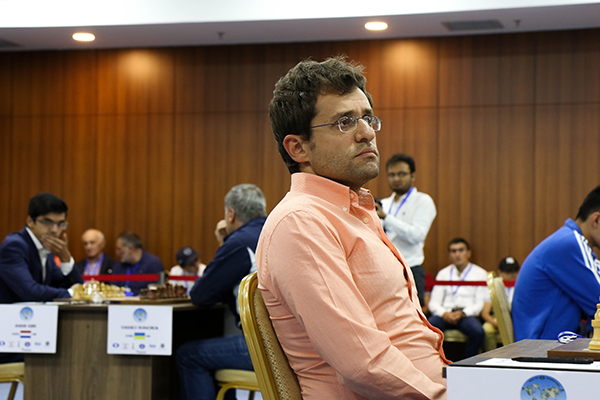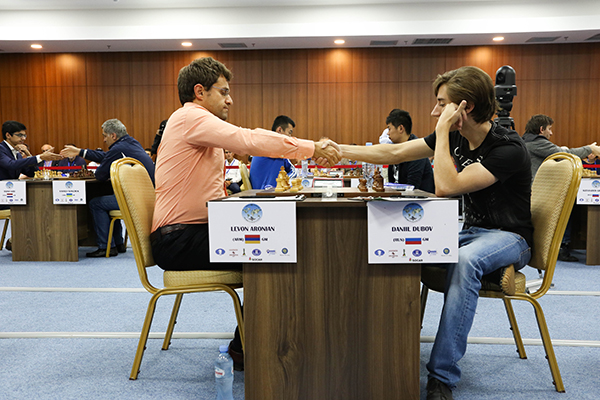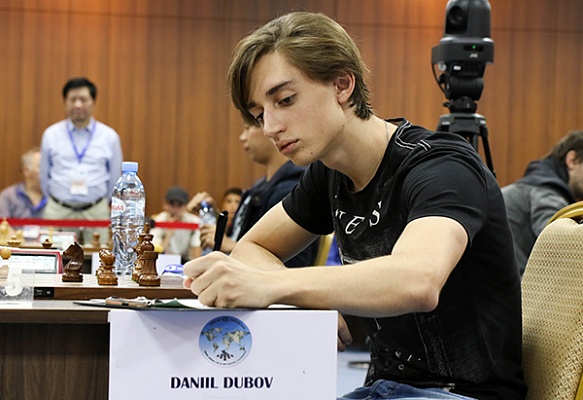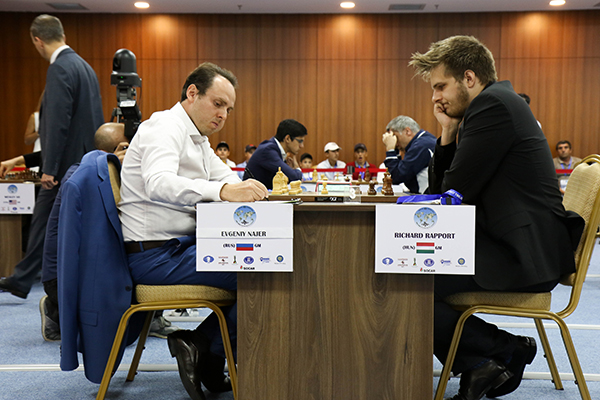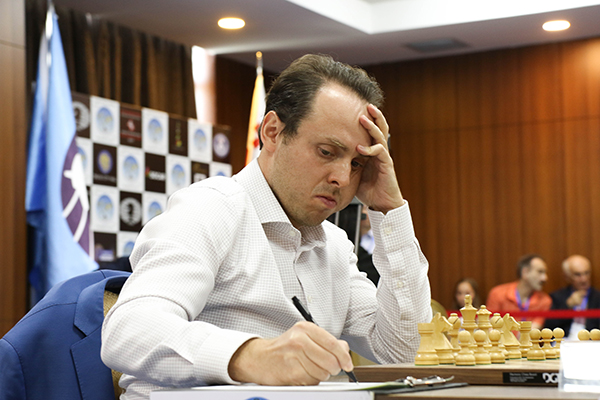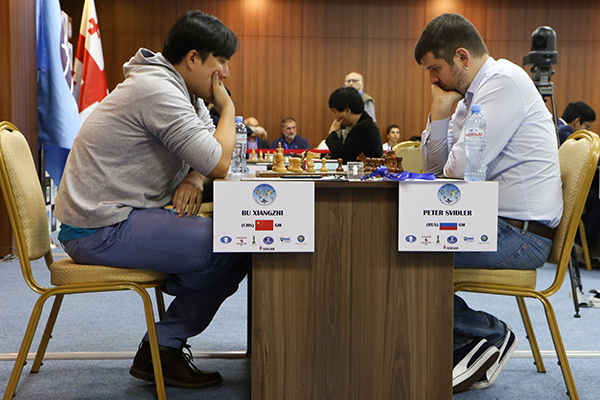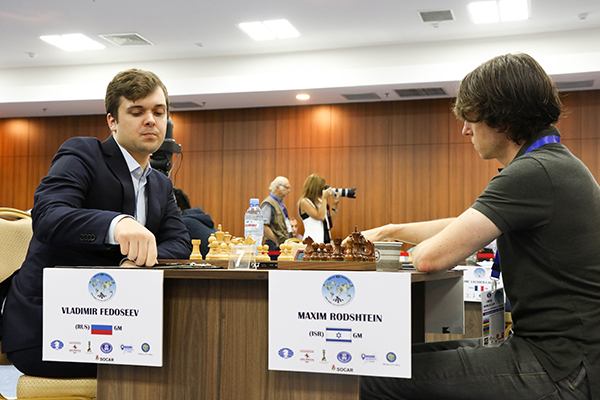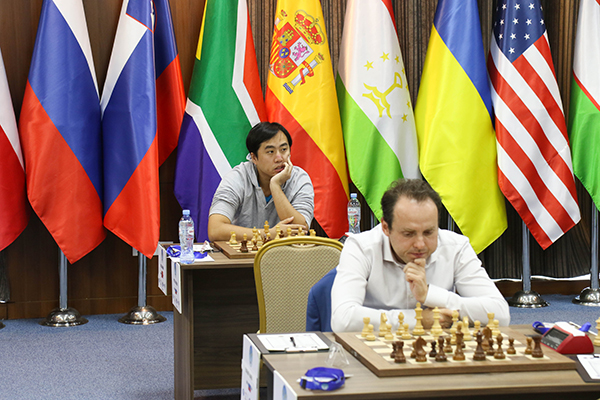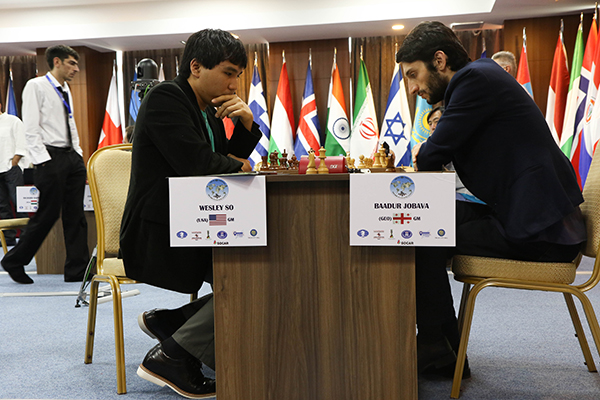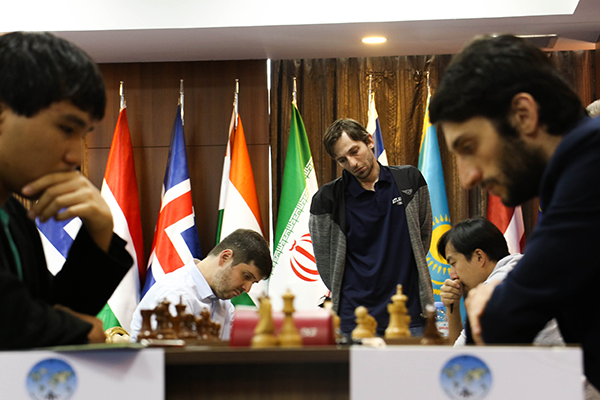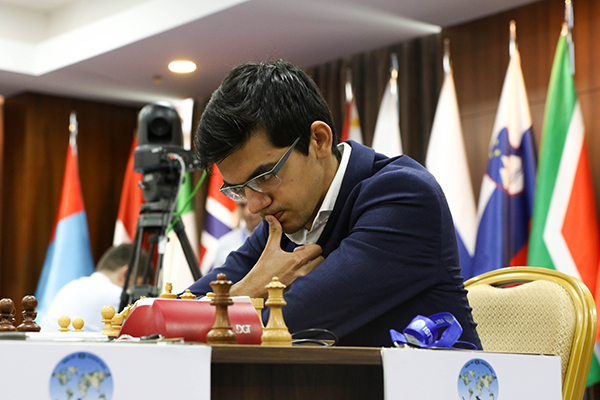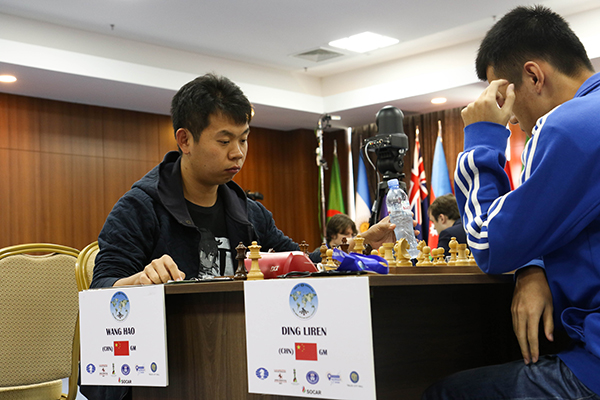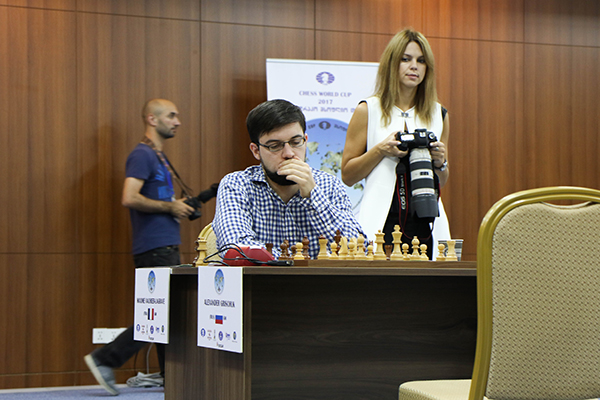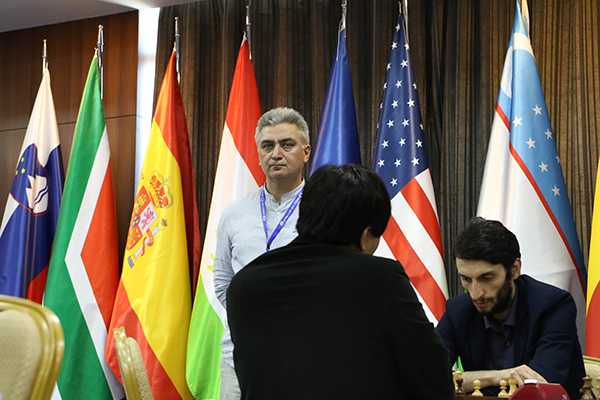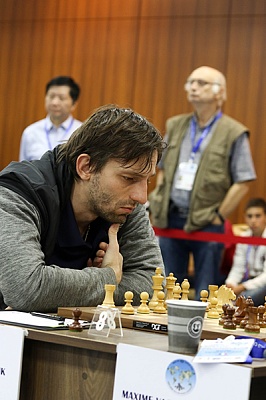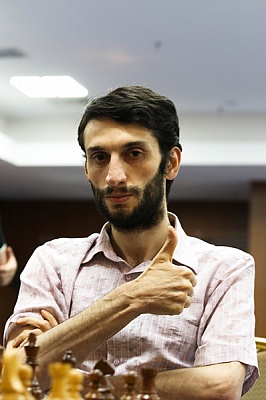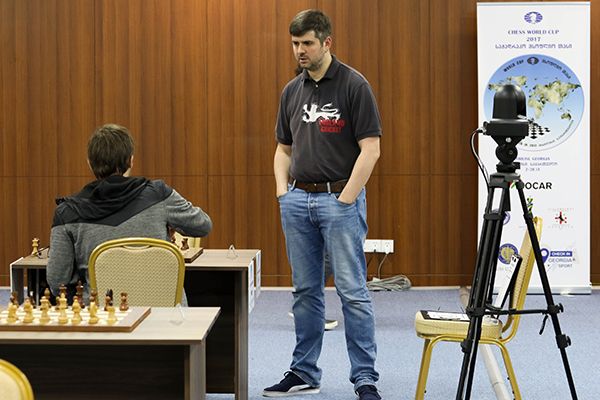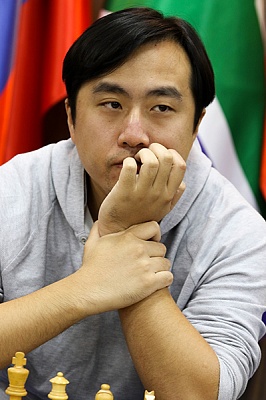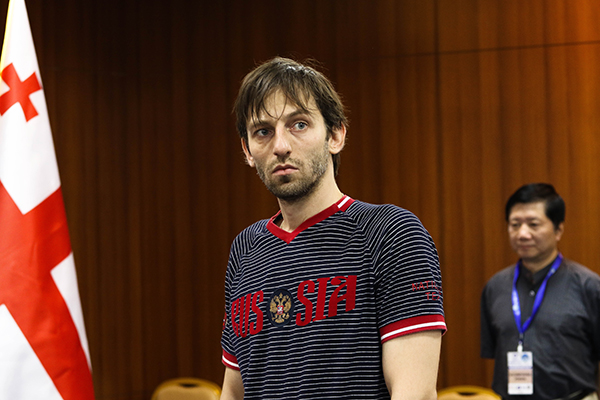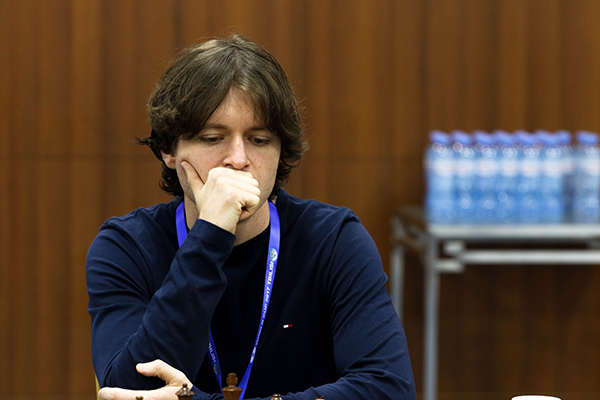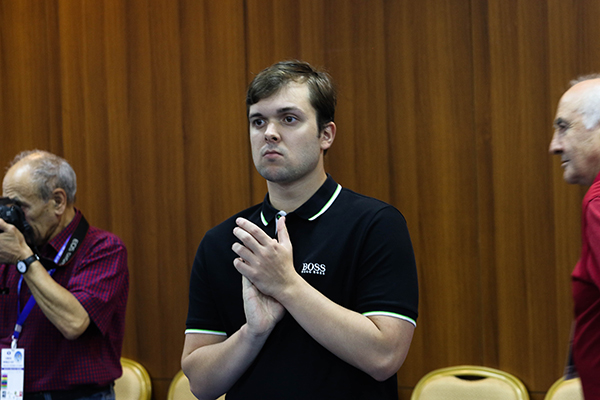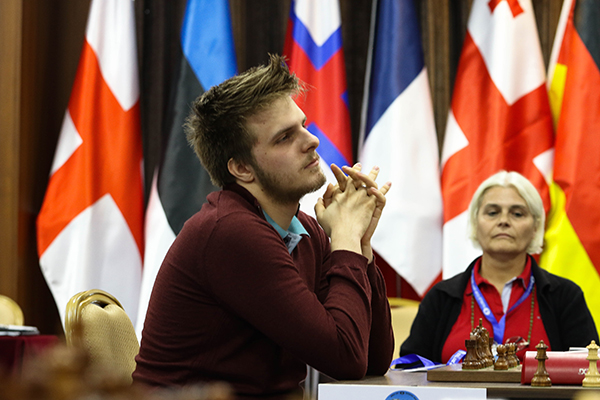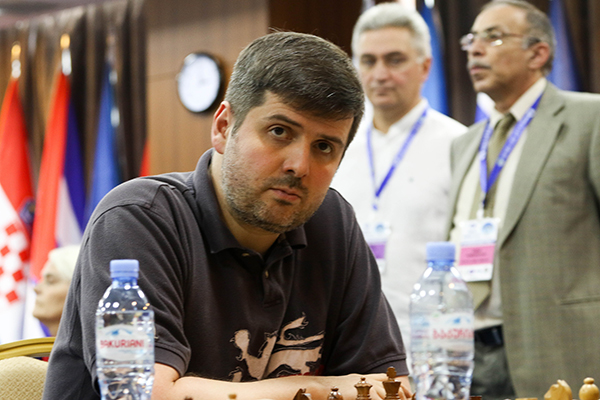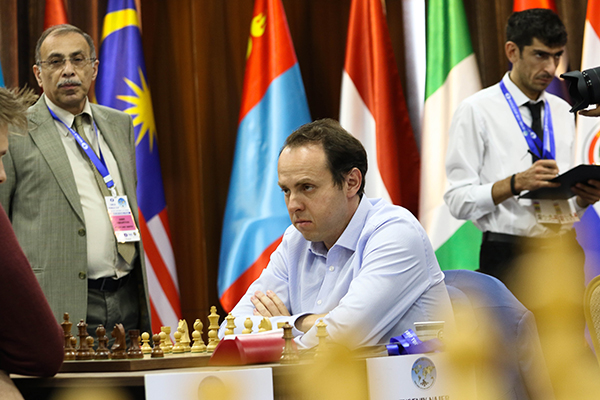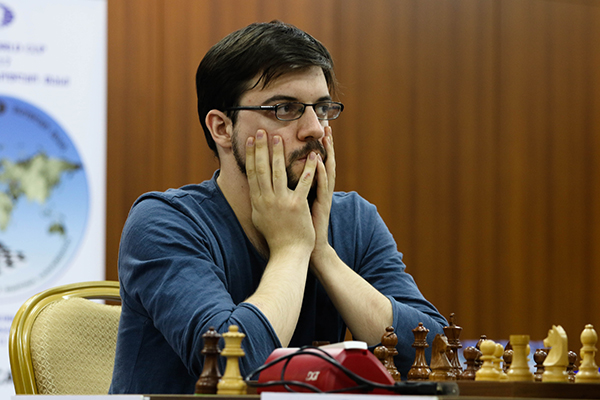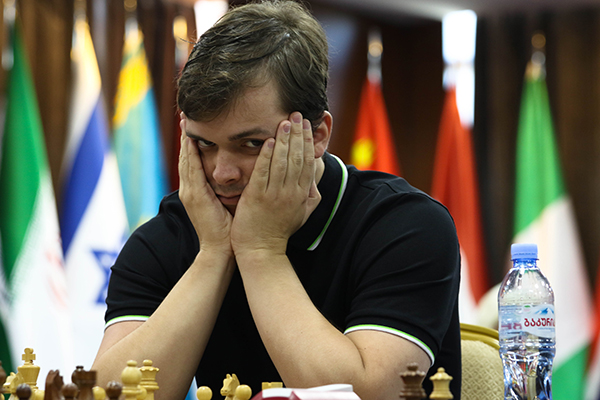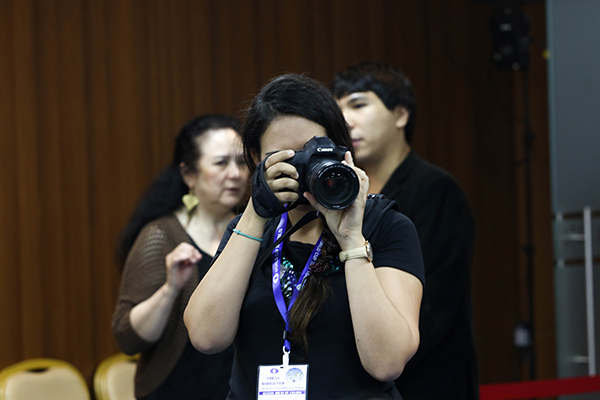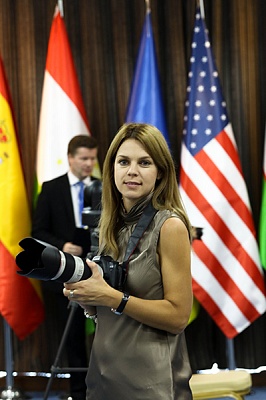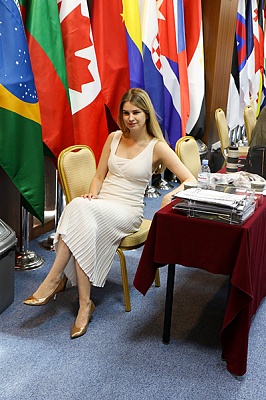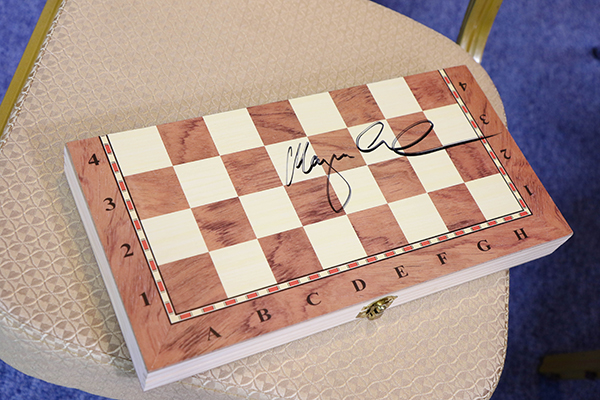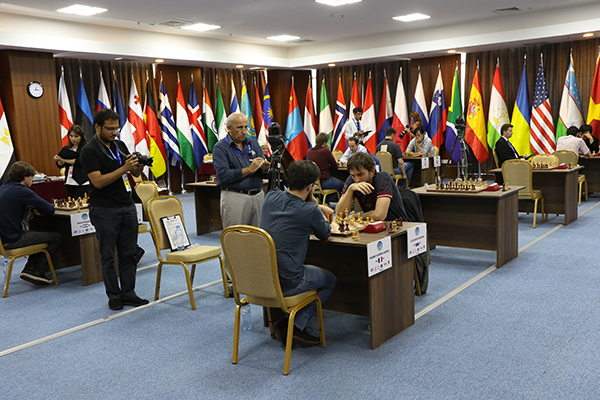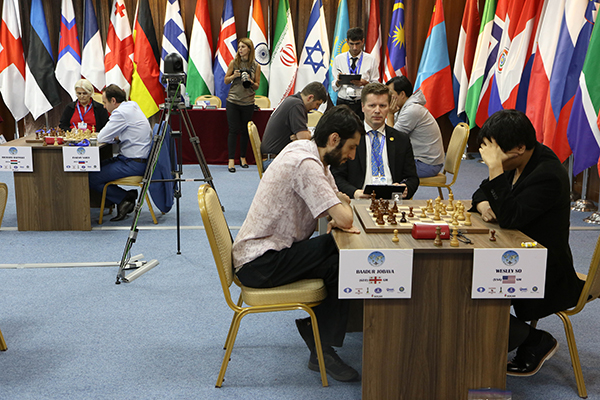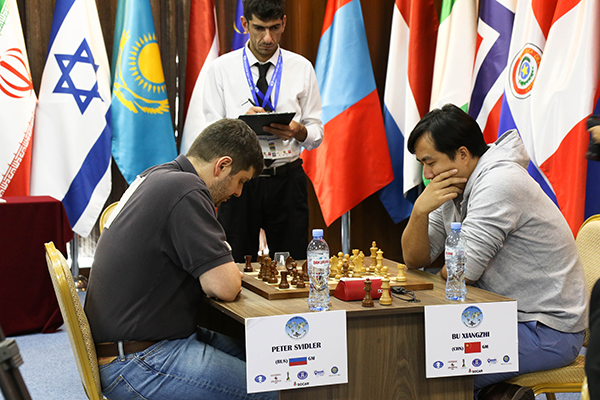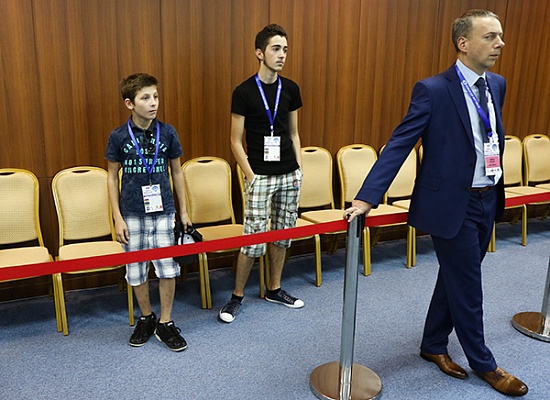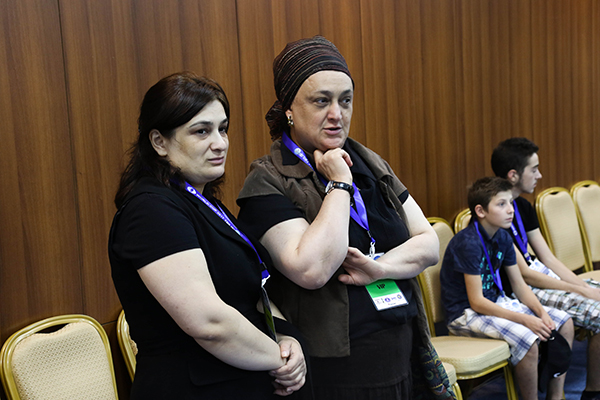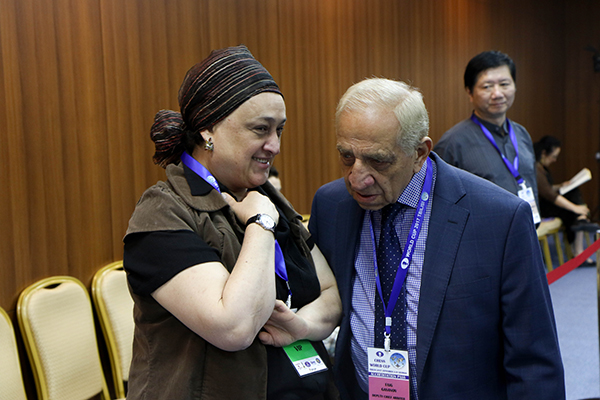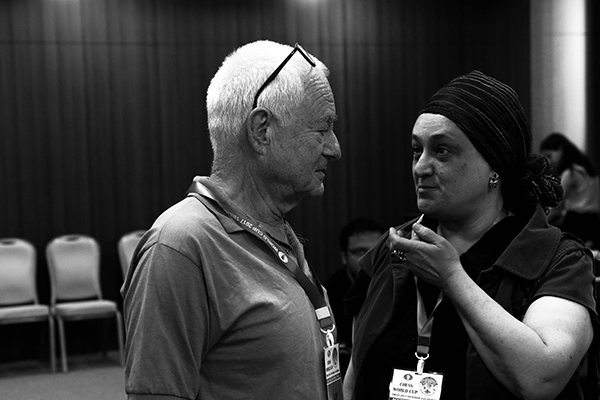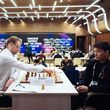Not for the Faint-hearted
1/8 matches of the World Cup in the review of Eteri Kublashvili
Yet another round of the World Cup is over. Out of twenty Russians who started out we are now down to only two. The circle of top ten players has now thinned to Maxime Vachier-Lagrave, Levon Aronian and Wesley So.
Day one
It was not without risk that Vladimir Fedoseev performed against Maxim Rodshtein, but it was the Russian’s active play that contributed to his success after all.
Vladimir Fedoseev, “The game was a Catalan opening that I had been preparing for, but Maxim’s 8. a3 and 9. b4 took me by surprise exactly in this position. I had this position analyzed with the inclusion of 8. cxd5 exd5; therefore, my real decision-making was during the game itself. I made up my mind to trigger an immediate crisis via 9…c5. This move should probably not work in this setup, but other alternatives seemed like a positional bind after c4-c5. I played 9…c5 for this reason, and the battle started. All in all, I am happy about my decisions: 14…Nfe4, 15…f6, 17…f5 and 18…fxe4. As the situation hotted up, I was inclined to think that my opponent should have undermined with f3 at the opportune moment to initiate massive liquidations. Apparently, Maxim believed his position to be superior based on the e4 and e6 pawns vulnerability.
The opponent underestimated my dynamic resources. We both played quite conceptually in the middlegame, and after 22. f4 he forced me into a pawn sacrifice 22...e5.
Rodshtein – Fedoseev
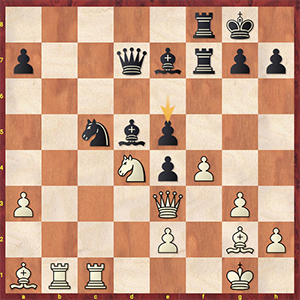
Failing this, my position would have been unsatisfactory, while the sacrifice not only blunted his a1-bishop, but other pieces do not have any particularly useful moves either. On the other hand, I can choose between assailing along the f-file or start pushing the h-pawn. The situation is such that my opponent’s extra material is not felt at all. Next, I managed to set up a successful blockade and launch an offensive against his king. Maxim was not in time to defend himself, nor do I think that it was an easy thing to do.
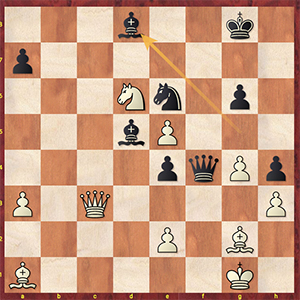
35. Nc4? is a crucial error as after 35…e3! there is no defending either against a checkmate or losing a queen, which actually happened in the game: 36. Bxd5 Qf2+ 37. Kh1 Qf1+ 38. Kh2 Bg5 39. Bxe6+ Kg7 40. Qxe3 Bxe3 41. Nxe3 Qxa1. White resigns".
Vassily Ivanchuk continues to happy his fans. Playing White in game one against Anish Giri, the Ukrainian grandmaster provoked his opponent into a kingside attack in a position with opposite-side castling by advancing the h-pawn one square forward. Anish did not need asking twice and rushed headlong into an attack, sacrificing a pawn while doing so. However, as the position simplified, the Dutch grandmaster allowed the trade of queens to his disadvantage. As a result, he failed to bail out of a rook ending down a pawn.
A mind-boggling game was played by Maxim Vachier-Lagrave and Alexander Grischuk. White sacrificed a pawn, and then quickly redeployed his main forces to the kingside. Alexander Grischuk’s precise play thwarted all direct threats, and prior to the first time control there erupted wild complications. Even though White was down a rook at a certain moment, he could get a powerful compensation. The Russian managed to simplify (although the "iron" friend even proves that Black could achieve an advantage) in time trouble and eventually transposed into a rook ending down a pawn.
Levon Aronian had a strong chance to defeat Daniil Dubov, who performed rather aggressively as White and had to give up an exchange to not end up in a worse position. Nevertheless, the Russian managed to keep his position together while down material – in a critical moment the Armenian grandmaster refrained from taking an unprotected pawn, and a tactical saver turned up to help White out.
Richard Rapport launched a full-scale operation as White and sacrificed a pawn. His opponent, Evgeniy Najer, repulsed an assault, but could not convert his extra material edge in the end.
The games So - Jobava, Wang Hao - Ding Liren and Svidler - Bu Xiangzhi progressed in a more tranquil positional manner and ended in draws.
Day two
Game two landed Vassily Ivanchuk, Levon Aronian and Ding Liren straight into the round of 4. In game two the Ukrainian grandmaster also had an edge over Anish Giri. Black had two extra pawns in a many-piece endgame, but Ivanchuk preferred to resort to a perpetual to force a draw.
Levon Aronian outplayed Daniil Dubov in a lengthy fight. The winner shared his insights into the game.
Levon Aronian: “My opponent handled the opening into a very suspicious line. Meanwhile, instead of playing solid chess, I decided to checkmate my opponent for some reason. This is when I overlooked his threatens to trade queens, as well as his 17…f6, upon which I seem to be in big danger.
Aronian – Dubov
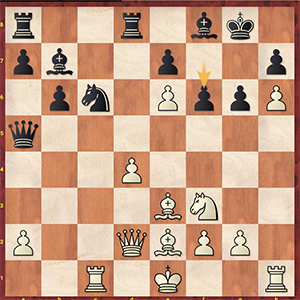
Here I offered a draw from a practical point of view. I did not like my position, and should Black after 18.0-0 Qxd2 19. Bxd2 have played a simple 19…Rac8, instead of 19…Nxd4, he would have captured the e6-pawn sooner or later. As opposed to this, the game continuation gave me a certain amount of active play.
20. Nxd4 Rxd4 21. Be3 Rdd8 22. Bb5 Bd5 23. Bd7
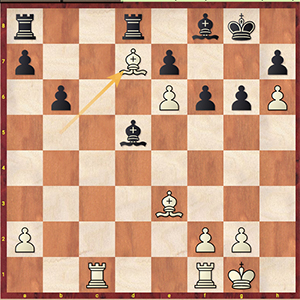
Here Daniil should have refrained from 23…g5 as it gives me some pressure. This move was followed by an immediate draw offer, but I thought I could gain more“.
The burden of fight shifted into the endgame with White having an exchange.
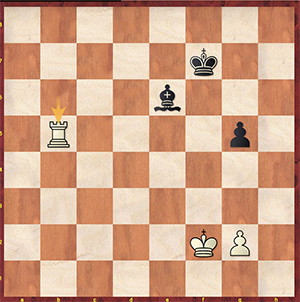
“I have known this ending to be winning from my long ago analysis, but could not recall a quick and easy path to the victory. As I had little time, I started to worry, understanding that I must not allow his king to g4”.
This ending, which had the opponents acting not in the best possible way, has been analyzed in detail by our colleagues from the Chess Pro website. Daniil missed his chances and had to recognize defeat on move 97.
Ding Liren outperformed his compatriot Wang Hao in a technical style.
White managed to create a weak pawn on c6 for his opponent in the Catalan opening, and then patiently did away with the stand-aloner.
Maxim Rodshtein came back as Black against Vladimir Fedoseev. The opening was a modern line of the Queen’s Indian Defense with the 6...Bg7 fianchetto and an opposite side castling. The Russian’s somewhat aggressive pawn moves away from his king gave Black a soft spot in the opponent’s structure to hook up to. White’s mistake was a transition into a rook ending up (!) a pawn: it turned out that Black’s better pawns and pieces coordination gained him an upper hand.
Fedoseev and Rodshtein went into a tie-break.
More draws followed in the games Svidler - Bu Xiangzhi, Vachier-Lagrave - Grischuk, So-Jobava and Rapport - Najer. These players also had to sort things out in tiebreaker matches.
Evgeny Najer and Richard Rapport were engaged in a tense maneuvering struggle, but the defensive and the offensive ended balancing each other out.
The host player Baadur Jobava pressed Wesley So as White, but the American managed to entrench and achieve a draw via massive liquidation of almost all pieces.
The games Grischuk - MVL and Bu Xiangzhi - Svidler ended in draws pretty early.
Tie-break
The tiebreaker matches had their participants in an extremely tense state both before and in the process. This can be easily seen from the pictures attached to the report.
There was quite a number of those who came to root for Baadur Jobava. It included a legendary Maia Chiburdanidze, who confidently suggested “first line” moves while analyzing together with Genna Sosonko and Zurab Sturua. Later the discussion was joined by the Fifth World Champion Nona Gaprindashvili – a guest always welcome in the press center.
Much to the grief of the Georgian fans, Baadur failed to overcome Wesley So. In game one the American got a slight but stable edge out of the opening, and achieved a pair of bishops’ edge in the middlegame. The American gradually arrived at the best setup for his pieces and chose an opportune moment for his central breakthrough, which won him a pawn. Black had to part with a piece, and, being down material, failed to bail out of the endgame. In the return game Baadur could not come back, and the final score is 1.5:0.5 to Wesley So’s favor.
Peter Svidler defeated Bu Xiangzhi in both games (even delivered a checkmate in game one), and shared his insights the game afterwards.
Peter Svidler, “During the tie-break everything was decided in game one, in which I blundered a move order / decided not to strain my memory to recall what I needed at the moment, which landed me into a very risky position. However, when time came to punish me, my opponent would not play concretely, which gave me a rather comfortable game.
Bu Xiangzhi – Svidler
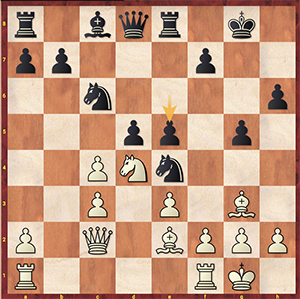
White met 14…e5 with 15. Nxc6?! I see it as a confirmation that it is not all that bad for me. 15. cxd5 seems to give White a substantial edge, but I saw no other way for me to handle the position. In the game we went for a position in which White sacrificed an exchange as he obviously believed it to be acceptable for hi. I saw from afar that the arising position was rather dangerous for him because he was not in time to consolidate. My conversion in the subsequent game was not ideal as the position was very tricky indeed. The engine points to some forced winning lines, which I could not find immediately. The clock time proved a crucial factor after all. I happened to turn my eyes towards the clock to see his time reading: 15 seconds. It crossed my mind to try find a move that might come as a surprise to him.
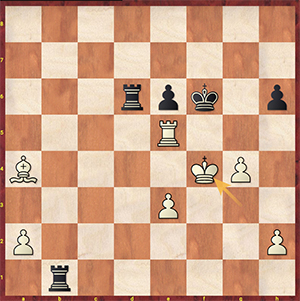
I opted for 39…Rd3, which is as good as any other move, but is unlikely to be part of the calculation. Indeed, the game finished almost immediately: 40. Ra5 Ra3 41. e4 Rf1#. With 15 seconds on his clock, my opponent decided to play whatever crossed his mind first, which was an immediate game over.
When his turn came to be in charge of the black pieces, he got a hopeless position around move 7. However, the current situation dictated his playing in a manner uncharacteristic for him, an extremely classical type of chess player. As opposed to that, he had to play sharp chess as Black to go all out for it, which was clearly a hard task for him. Indeed, further events required me only not blundering anything, which I coped with successfully”.
Vladimir Fedoseev, Peter’s compatriot, also scored 2:0 over Maxim Rodshtein. Vladimir claimed the match as an especially tough one.
Vladimir Fedoseev, “Classical game two was a perfect display by Maxim. I thought it of great importance to simply go on playing chess and forged about my defeat. Rapid game one was very nervous: I got an excellent position and probably a big edge, but then spent a lot of time calculating. I ended up winning an opposite-colored bishop ending up a pawn; besides, my opponent made an illegal move. (An illegal move entitles an opponent with adding two minutes to his clock time– ed.). What a turn of events!
Game two was an absolutely crazy one. This game is likely to teach you that playing bad chess may be an option when it comes to making a draw. However, in the dynamic stage I was better and gained the upper hand”.
Below-given is not for the faint-hearted:
Rodshtein – Fedoseev
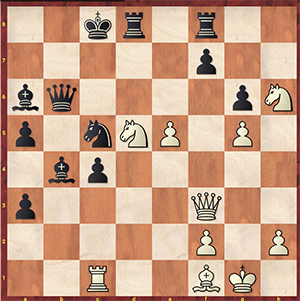
37…Rxd5?!
An exchange sacrifice does not seem forced, but Vladimir decided to clear the big diagonal of all obstacles.
38. Qxd5 Bb7 39. Qxc4 Qc6 40. Qg4+ Kb8 41. f3?
White should have traded via 41. Bg2.
41…Qd5 42. Bg2 Nb3 43. Rd1 a2. White resigns.
The Russian Evgeniy Najer went down to Richard Rapport 0.5:1.5. In game one a certain edge was with the Russian, but it did not transform into something more tangible. In the return game Evgeniy was defending a difficult many-piece ending down an exchange and, while in search of counterplay, overlooked a defensive resource available to White:
Rapport – Najer
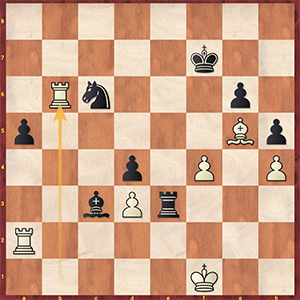
45…Re1+ 46. Kg2 Nb4 seems like a draw since one of the sides is going to deliver a perpetual.
However, Evgeniy played 45…Nb4?, overlooking 46. Re2!, and after 46…Nxd3 47. f5 Rxe2 48. fxg6+ Kg7 49. Kxe2 Nc1+ 50. Bxc1 had to resign.
Alexander Grischuk and Maxim Vachier-Lagrave drew two rapid games, and in the first 10-minute duel the victory was scored by the Frenchman.
Vachier-Lagrave – Grischuk
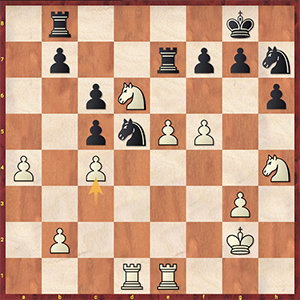
35…Nc7 turned out an error in view of 36. e6! fxe6 37. Ng6 Rd7 38. fxe6 Rdd8 39. Ne7+ Kf8 40. Nxc6! Rxd6 41. Nxb8 Ke7 42. Rxd6 Kxd6 43. Rd1+ Kxe6 44. Rd7. Black resigns.
In game two the Russian outperformed the opponent to achieve material superiority (a rook and pawn versus a bishop and pawn), but could not convert in the endgame. Thus, MVL progresses into the next round.
1/4 pairings:
Svidler - Vachier-Lagrave, Aronian - Ivanchuk, So - Fedoseev, Ding Liren - Rapport.









